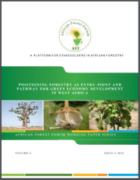This report presents the harmonized and expanded results of studies carried out in 2016 by two teams of researchers on the potential of forests for green economy development in West Africa: the Anglophone study in three sample countries namely: Nigeria, Ghana and The Gambia, and the Francophone study in another three West and Central African countries namely: Niger, Benin and Gabon. The current study also benefits from information obtained from grey sources and the researcher’s experience in West African societies. Although variously defined, United Nations Environment Programme (UNEP) describes green economy as low carbon (C), resource-efficient and socially inclusive economy. Forests meanwhile were placed at the center of green economy development in 2009 during the United Nations Economic Commission for Europe /Food and Agriculture Organization (UNECE/FAO) Conference in Geneva, titled “Forest sector in the green economy”. The conference consensually concluded that there was a key role for forests in the transition towards green economy and a more sustainable society. The current study upholds the preceding assertion and proposes to generate verifiable information necessary to increase awareness of policy makers and other actors in West Africa on the role and contribution of forests to the development of a green economy in the sub-region. The study focuses on forests as biological capital for wealth creation, elimination of poverty and stimulation of economic activity. The study identified key elements and proposed how they may be explored to ensure forests’ contribution to green economy development without risking sustainable forest management SFM). With respect to food security and development: rational exploitation of edible forest commodities; systematic reforestation and rational exploitation of floodplains for enhanced fisheries; planned greening and sustainable use of agricultural production schemes including agroforestry; and planned enrichment of pastures with fodder tree species for enhanced livestock husbandry. With respect to forest assets for economic and social development: planned expansion and intensification of forest biomass stock; sustainable bio-trade in forest foods, bio-medicines and cottage industry products; sustainable development of industrial wood markets, biomass-based energy, and improved energy efficiency; and sustainable exploitation of ecological tourism and intangible heritage assets. As regards forests for environmental stability and security: conservative management of biodiversity; sustainable management of watersheds; rational exploitation of climate related development processes; and the greening and sustainable use of urban spaces for recreation, leisure and development.

